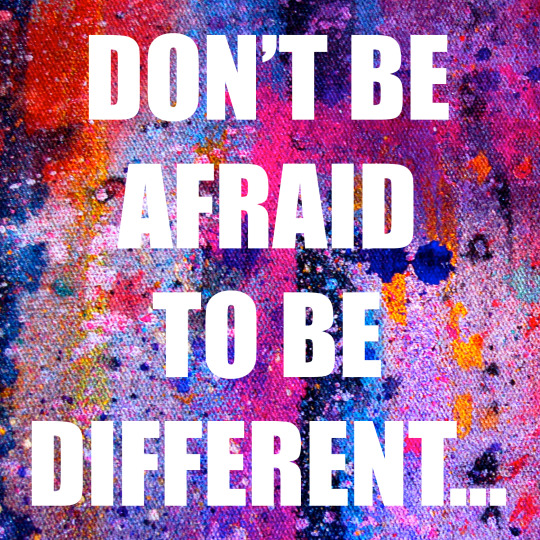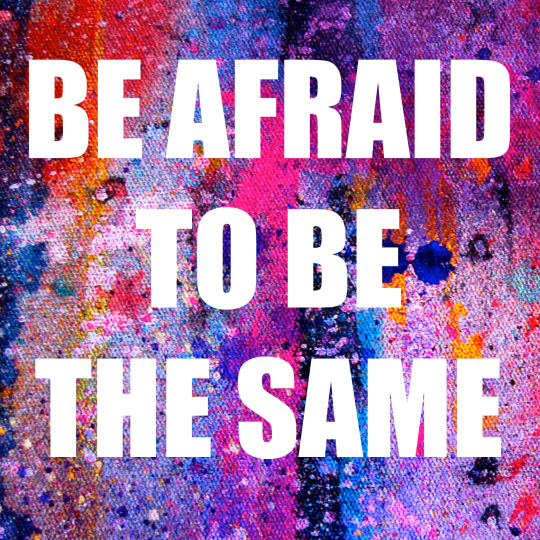Don't wanna be here? Send us removal request.
Text
Overdetermination
Overdetermination refers to the way that the unconscious mind rallies against our conscious selves and analyses feelings and situations too deeply. With this, we get create a situation that has been overthought and overdrawn, finding too much meaning in something small and trivial. Basically, overdetermination is every time you thought your English teacher was pulling meanings out of single words in Shakespeare plays. For me, I can find overdetermination present in my everyday life through my anxiety, which is highly present within my writing as each individual word that is placed onto a page is overthought and picked with excruciating precaution.
2 notes
·
View notes
Quote
Authenticity isn’t just openly admitting to how other people make you feel, it’s also openly admitting to how you make other people feel.
Kassandra Dea (via enigmatic-being)
19 notes
·
View notes
Quote
would I really rather be a cyborg than a goddess? The former hails the future in a telelogical technological determinism–culture– that seems not only overdetermined but exceptionalizes our current technologies. The latter–nature—is embedded in the racialized matriarchal mythos of feminist reclamation narratives. Certainly it sounds sexier, these days, to lay claim to being a cyborg than a goddess. But why disaggregate the two when there surely must be cyborgian-goddesses in our midst? Now that is an becoming-intersectional assemblage that I could really appreciate.
Jasbir Puar, ‘I would rather be a cyborg than a goddess: ’Intersectionality, Assemblage, and Affective Politics (via irresistible-revolution)
77 notes
·
View notes
Text
Sensory Knowledge
Sensory knowledge refers to the information we gain we gain from our bodies external senses. We rely on our senses – sight, smell, sound, taste and scent – to gain and relay knowledge that we couldn’t necessarily pick up or give from verbal communication. Even though we are born with these senses to help us act within our environment, our cultural backgrounds impact the efficiency of these senses immensely. The way we process our information and our differentiating views and perceptions are influenced by our various social backgrounds, and therefore create our different senses.
0 notes
Text
Fractured Identity
The fractured identity is looking at the many different aspects and personalities that create our identity and working out how they combine to create who we are. This is a common theme throughout literature as we see many different levels of a character, depending on who they are intereacting with and the circumstances at that current moment. This concept is also extraordinarily present in our everyday lives; You wouldn’t interact the same way with your great-grandmother that you would with a colleague. These separate aspects of one identity combined allow an individual to continue being complex and multi-dimensional as a human being.
0 notes
Text
Subjectivity
The concept of Subjectivity covers the idea of what makes us human, and how it makes up our identity. Barker explains that that subjectivity is that everything that makes up our identities, from our core genetics and cultural backgrounds, to the situations we experience on a day to day basis (p.218, 2007). In my opinion, this connects beautifully with the ‘Nature vs Nurture’ theory, as it debates that our identities can either be created from our genetics from our parents, or we can build our identity based off past experiences. However, I believe that subjectivity is separate as a healthy mix of who we are genetically and who we are from practice is necessary for an individual to healthily find their identity.
0 notes
Text
Essentialism
“Essentialism assumes that descriptions of people reflect an essential underlying identity” (Barker, 2007, p.220). With essentialism, we are looking at how we as individuals are perceived by general strangers, and how our culture and appearance have direct correlation and impact on our identity. Basically, despite who you try to make yourself out to be as a person, you will be perceived for the way you look on the outside, and that will become a part of your identity. The concept states that for any given entity, there are specific traits and attributes which are completely necessary for that entity to function and hold an identity.
0 notes
Text
Social Identity
The social identity is all about how people are perceived by other people; ‘How do we see ourselves, and how do others see us?’ (Barker, 2007, p.219). This concept of a social identity covers how we identify and what/who we identify with and how others view us with that association in mind. The things we identify with and the people we connect with become a part of the general make up of our identity. For example, as someone who loves pop-culture, I identify with a lot of fan culture and find it easier to connect with someone who shares similar identity attributes.
0 notes
Text
Creative Influence
What inspires you as a creator? What influences you to practice your art? When it comes to me personally, I find my creative influence can be anything from my pretty sunset over a scenic view, to my best friend’s terminal illness. A creative influence is anything that sparks your creative flare and inspires you to go out and make any kind of art. Everyone is inspired by many different things in numerous different ways, allowing someone to cater their art in such a way that it is completely unique to them; these influences can ultimately change the way you look at your existing art.
0 notes
Text
Creative Identity
I’ve always been told that your identity is YOU. My identity is everything that makes me, me – from the colour of my hair, to the songs I’m listening to while I’m typing this out. So, it’s pretty safe to assume that my creative identity is everything that I am as a creative individual. It’s the subject matter that inspires me to the characters I create while I’m washing my hair. Your creative identity is as unique to you as a snowflake’s patterns are unique from the next one. My creative identity as a writer is 100% different to that of my ukulele playing, theatre performing roommate.
0 notes
Text
Authenticity
For me, the first word that comes to mind when I try to define ‘Authenticity’ is ‘genuine’. While it’s difficult to confirm or deny whether an artist is being completely real, it’s an authentic persona that allows a fan to truly connect to the work and the personality of the artist.
An example close to my heart is that of J.K Rowling, using initials as her pen name instead of her real name to avoid any sexist bias when publishing the first Potter book. Talking about an issue like this creates a connection with her audience, ‘she faces problems too!’.
0 notes
Photo


Michael Carini | The War of Art
169 notes
·
View notes